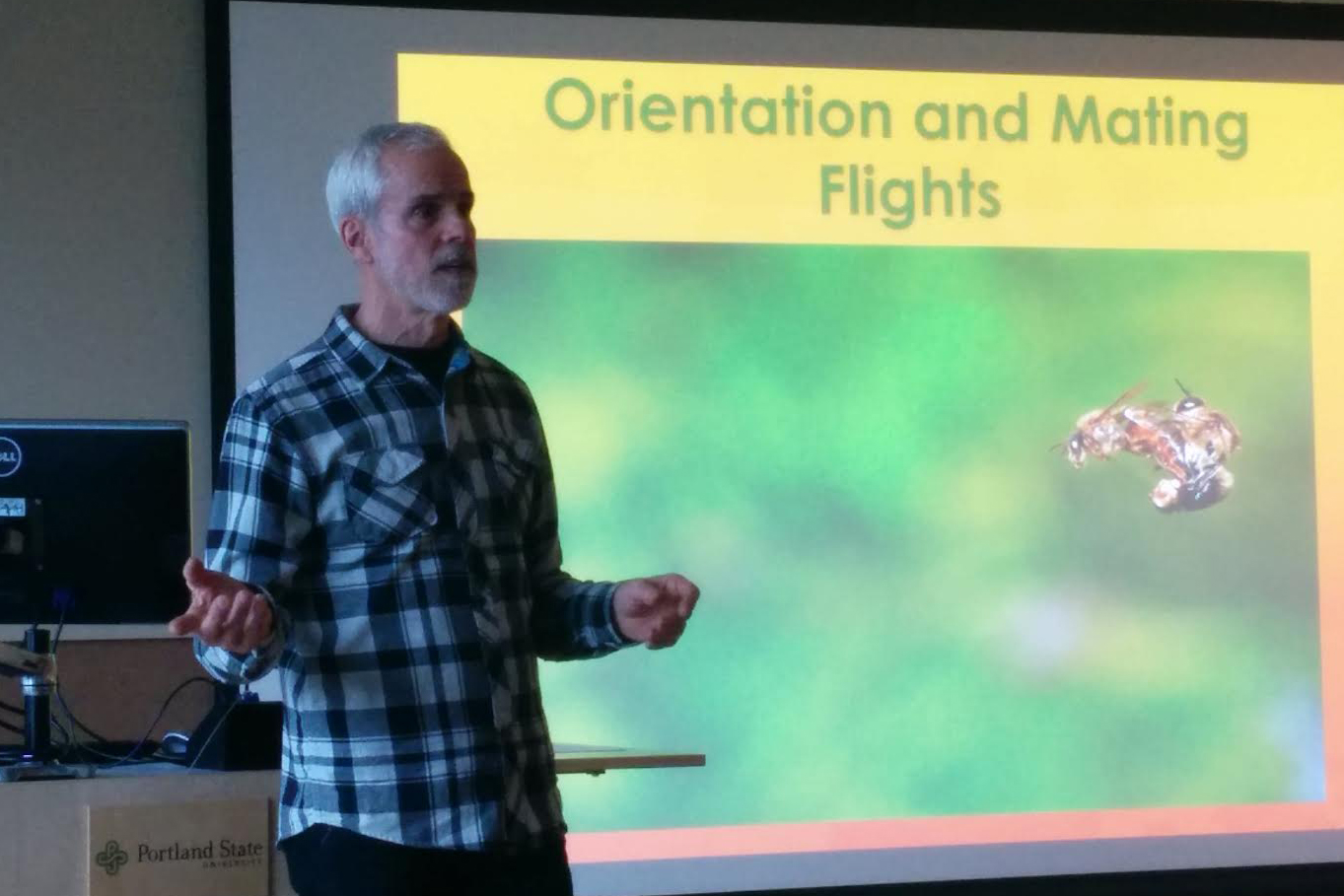The Student Sustainability Center hosted Tim Wessels’ Beekeeping 101 Workshop. Wessels, the founder of Bridgetown Bees and former president of the Portland Urban Beekeepers, has been instrumental in the creation of Portland State’s first apiary, which is coming to campus.
Wessels’ passion for bees was palpable as he explained the various types of honeybees, the life cycle of the bee, what’s entailed in bee maintenance, the equipment involved, and how to respectfully work with and care for bees during the workshop on Jan. 17.
“I think they’re pretty amazing,” Wessels said. “A true democracy. I absolutely love beekeeping and the honeybees.”
But much of the time was spent answering questions from the audience, of which there were many, from inquiries about the queen bee’s mating flight to how they communicate to how they achieve genetic diversity.
At the end of his presentation he shared slides of the hives in his own backyard. The audience laughed as he told them how his wife is always yelling that there are too many bees in their yard.
“But many of these bees are ones that are special to me,” Wessels said. “They’re all kind of special to me. They have a spot in my heart. It’s sort of emotional for me because they’re hurting and they need our help. So that’s why I’m doing what I’m doing.”
The three main threats that honeybees face are the pest Varroa Mite, the use of insecticides, and the lack of forage. Wessels said that 50 percent of bees are not surviving and die in the winter.
One of the greatest things individuals can do to help the bees is plant more plants for them. You can also be help by eating honey that is truly local. He stressed the importance of knowing where your honey comes from, knowing the beekeepers and how they treat their hives.
“Do they use chemical pesticides in their hives? Are they doing good, sustainable things? Or are they just in it for making a buck?” Wessels said.
But Wessels is optimistic and that’s why he is excited about the apiary at PSU and hopes students will get involved.
Bringing honeybees to PSU is a student-initiated project that’s been percolating for some time. Heather Spalding is the Sustainability Leadership and Outreach Coordinator at the Student Sustainability Center and a key figure in the project.
In order to build the apiary, which will include two hives, Spalding and her team face a litany of tasks: following the necessary liability protocol, notifying all neighbors within 150 feet, passing a city inspection, receiving the risk manager’s approval and working with the Environmental Club to manage the orchard.
The orchard, located at 12th and Montgomery across the street from Epler Hall, is on permit from the Oregon Department of Transportation. Currently it has over 30 different types of fruit trees, in addition to other pollinators that create a diverse ecosystem with plenty of foraging for the honeybees.
Stefanie Steele, the beekeeping intern, and her volunteers recently planted blueberry bushes for this purpose.
The bees will be ordered in April and will arrive shortly after. Until then, Spalding and Steele are preparing to educate a volunteer task force who will take care of the bees throughout the year. And if the turnout at the workshop is any indication of student interest, they should have plenty of help.
“I was very happy,” Spalding said. “It was a weekend, the day before a holiday, and it was raining. And we had over 40 people there. I was really impressed by the questions that were asked. That was the biggest highlight for me—seeing how engaged people were. It seemed like everybody was excited.”
Naomi Sheff, a student attending from Lewis & Clark College, feels this kind of education is important.
“It’s something that’s so important to know about, with the threat to bees today,” Sheff said. “There are things we can all do to actually change what’s going on.”






